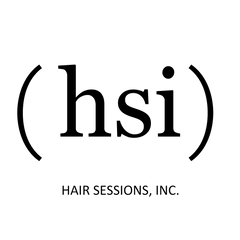Let’s separate fact from fiction. Which myth have you heard before?
Hair care advice is everywhere—from your best friend to beauty influencers. But not everything you hear is true. Misinformation can cause more harm than good, especially when it comes to maintaining healthy hair. It’s time to debunk the most common hair care myths that might be holding your hair back from reaching its full potential.
Myth #1: Relaxers Always Damage Hair
The Truth:
Relaxers don’t damage hair when used correctly. Damage typically results from misuse, overprocessing, or poor aftercare. Licensed professionals, like moi, understand the science behind chemical treatments and know how to balance the hair's pH and moisture levels.
Best Practices:
-
Always use a professional stylist
-
Schedule regular protein treatments
-
Keep hair moisturized and avoid overlapping chemicals
Myth #2: Silk Presses Don’t Last in Humidity
The Truth:
Silk presses can hold up in humidity when done with proper technique and high-quality products. The longevity depends on the hair's porosity, heat protection, and post-care routine.
Pro Tips:
-
Use anti-humidity serums
-
Wrap hair at night
-
Avoid moisture-rich environments for the first 48 hours
Myth #3: Trimming Hair Makes It Grow Faster
The Truth:
Hair growth occurs at the scalp, not the ends. However, trimming split ends prevents breakage, giving the illusion of longer, healthier hair over time.
Maintenance:
-
Trim every 6-8 weeks
-
Use sharp shears (never household scissors, y'all!)
Myth #4: Natural Hair Doesn’t Need Shampoo
The Truth:
All hair types need to be cleansed regularly to remove product buildup, sweat, and dirt. Co-washing alone doesn’t provide a deep clean.
Suggested Routine:
-
Use sulfate-free shampoos
-
Clarify monthly
-
Moisturize after every wash
Myth #5: Oil Moisturizes Hair
The Truth:
Oils seal in moisture; they don’t provide it. Applying oil to dry hair can actually worsen dryness over time.
Correct Order:
-
Hydrate with water-based leave-in
-
Seal with oil or butter
Myth #6: You Must Grease Your Scalp
The Truth:
Heavy greases can clog pores and lead to scalp issues. A healthy scalp maintains its own oils with the right care.
Alternatives:
-
Use lightweight oils like jojoba or tea tree
-
Focus on scalp massages to stimulate blood flow
Myth #7: Protective Styles Always Protect
The Truth:
Tight braids or wigs with poor ventilation can cause more harm than good. Protective styles should not strain your hairline or prevent you from caring for your scalp.
Healthy Styling Tips:
-
Don’t keep styles in longer than 6 weeks
-
Moisturize and cleanse even in protective styles
Myth #8: You Shouldn’t Color Relaxed Hair
The Truth:
It’s possible to color relaxed hair if done with caution and by a professional. Timing and the type of dye used are crucial to avoiding breakage.
Guidelines:
-
Space chemical treatments at least 2 weeks apart
-
Use bond-building treatments
Myth #9: Hair Type Determines Hair Health
The Truth:
Hair health is influenced by how you care for it, not your curl pattern or type. Any hair texture can be damaged or healthy depending on the routine.
Focus Points:
-
Proper moisture/protein balance
-
Regular trims
-
Scalp health
Myth #10: You Need to Use the Same Product Line
The Truth:
Mixing products from different brands can still yield great results. What matters most is your hair's needs.
Smart Mixing:
-
Read ingredient lists
-
Avoid product overload
Myth #11: Only Expensive Products Work
The Truth:
Price doesn’t always reflect performance. Many affordable brands offer excellent ingredients and results.
Budget-Friendly Heroes:
-
Look for products with nourishing oils, proteins, and humectants
-
Check reviews and ingredient efficacy
Myth #12: Daily Washing is Necessary
The Truth:
Over-washing can strip natural oils. Most hair types benefit from washing once a week or every 10 days.
Ideal Routine:
-
Co-wash mid-week if needed
-
Listen to your scalp
Myth #13: Hair Can Become Immune to Products
The Truth:
Hair doesn’t build immunity, but buildup can reduce a product’s effectiveness. A clarifying shampoo helps reset your hair.
Reset Tips:
-
Clarify monthly
-
Alternate products based on seasons or needs
Myth #14: Split Ends Can Be Repaired
The Truth:
No product can fuse split ends permanently. The only real fix is trimming.
Prevention:
-
Limit heat usage
-
Deep condition regularly
Myth #15: Air-Drying is Always Better Than Blow-Drying
The Truth:
Air-drying isn't always ideal, especially if it leads to tangling or a damp scalp. Blow-drying with a heat protectant can be safer in some cases.
Balanced Approach:
-
Use a diffuser or cool setting
-
Detangle while wet to reduce stress
Final Thoughts
Hair care isn’t one-size-fits-all, but debunking these myths can lead to better decisions, healthier hair, and less frustration. Next time you hear a "rule" about hair, ask: is it rooted in science or superstition?
Which of these myths surprised you the most? Share your experiences in the comments!
FAQs
1. Can I use heat on my hair every day if I use a heat protectant? Even with protection, daily heat styling can cause damage over time. Limit heat use to 1-2 times per week.
2. Is it bad to switch shampoos often? Not at all! Switching shampoos based on your hair’s condition (like moisture or volume needs) is beneficial.
3. Do relaxers cause hair loss? Not directly. Hair loss can occur from improper application or scalp burns, not from the relaxer itself.
4. How do I know my hair needs protein? If your hair feels mushy, overly elastic, or breaks easily, it may need a protein treatment.
5. Are natural ingredients always better? Not always. Some natural ingredients can irritate the scalp or be too harsh. Always patch test first and monitor results.


Leave a comment